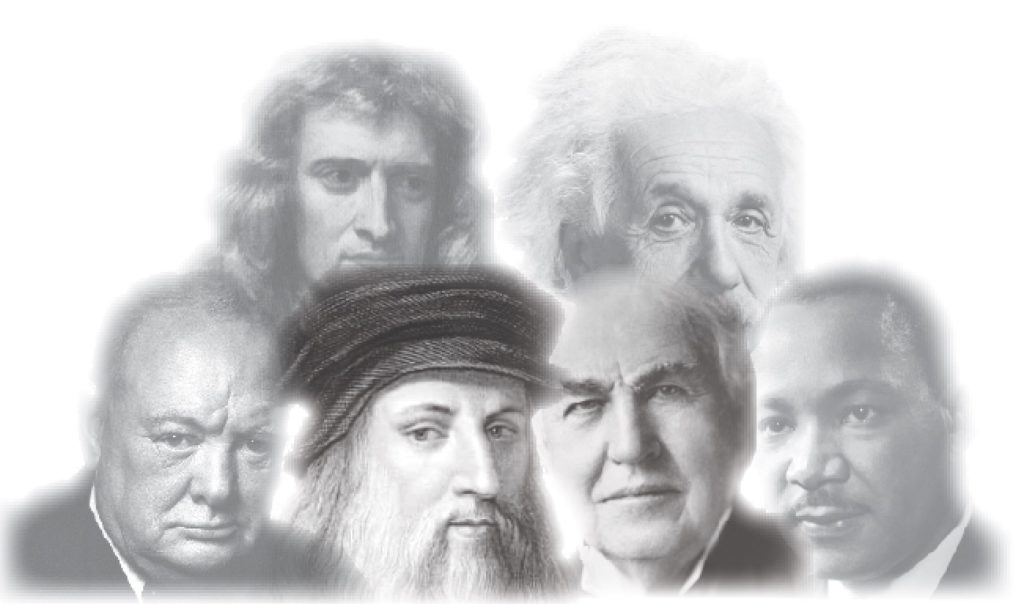
The challenge in answering this question arises from the fact that we do not have IQ results for people who existed before the 20th century. We identify geniuses based on their contributions and then estimate their IQ based on their achievements. This is circular reasoning. To circumvent this problem, we must find independent means of estimating their IQ.
Who are the people that we recognize as geniuses? Most would agree that the “geniuses” from previous generations include Leonardo da Vinci, William Shakespeare, Isaac Newton, Albert Einstein, Nikola Tesla, and, more recently, perhaps, Terrence Tao. Were these “geniuses” merely people of limited IQ who worked hard, or were they intellectually “hardwired” differently from the rest of us? It would be comforting to many if we were to dismiss them as ordinary people who were just hardworking overachievers. This would allow us to believe that these geniuses are or were no different from us, except in their dedication and work ethic. However, a deep dive into the nature of their achievements reveals that the difference between these people and the rest of humanity is not a matter of degree, but a matter of magnitude. As the philosopher Schopenhauer famously observed, “Talent hits a target no one else can hit; genius hits a target no one else can see.”
Let’s take a brief look at Einstein’s achievements. In 1905, while still toiling as a clerk in the Patent Office, Einstein was awarded a doctorate by the Zurich Physics Institute for his 21-page dissertation, A New Definition of Molecular Dimensions. However, achieving a Ph.D. in physics was a relatively minor accomplishment for Einstein in what has become known as his annus mirabilis (miracle year).
On March 17, 1905, just three days after he turned 26, Einstein submitted to the physics journal Annalen der Physik a paper explaining the photoelectric effect–a paper for which he would eventually receive a Nobel Prize.Then, on May 11, just two months later, he submitted to that same journal another opus magnum, this time on Brownian motion, explaining how colliding molecules produce the random motion observed when microscopic particles like pollen grains oscillate in water.
Despite the significance of these two papers, they would eventually be eclipsed in importance by a third containing a revolutionary insight captured in his Special Theory of Relativity–an insight that would revolutionize physics irrevocably by challenging Newton’s assumption that space and time are absolute. These three papers, any one of which would have earned Einstein a place among the greatest physicists of all time, appeared in the celebrated Volume 17 of Annalen der Physik in July 1905.
As if this flurry of papers were not enough, on September 27 of the same year, he submitted yet a fourth paper, an “addendum” to his Special Theory of Relativity which was subsequently published in Volume 18. In it, he derived his famous equation E = mc2 that defines his mass-energy equivalence principle and often serves as an icon for the discoverer himself. This prodigious output cannot be attributed to hard work alone, because Einstein was only 26 years old and had just finished his formal university studies. Similar paradigm-creating achievements are evident in Newton’s discoveries in his anni mirabili that occurred during his mid-twenties.
Since the development of IQ tests in the early 20th century, we’ve discovered a strong correlation between IQ and academic achievement. In his book Outliers, Malcolm Gladwell asserts that almost all Nobel laureates have an IQ above 130. Of course all these high achievers have a strong work ethic, because that’s the only way to master a subject and extend its frontiers. This naturally leads to the supposition that hard work might be the only factor separating the geniuses from the rest. However, recent research by Bouchard and others, as well as genetic investigation of SNP’s have revealed that there is a great deal of diversity in human intelligence and much of it is determined by our individual DNA.
In spite of all this emphasis on IQ, there is some good news for everyone. If your IQ isn’t in the stratosphere, that shouldn’t prevent you from great accomplishment. Sir Winston Churchill, who was a runner-up to Einstein in Time Magazine’s Person of the Century vote, made a gigantic contribution to civilization that brought him numerous awards and honorary doctorates, prompting him to say, with great humility, “Perhaps no one has ever passed so few examinations and received so many degrees.”
